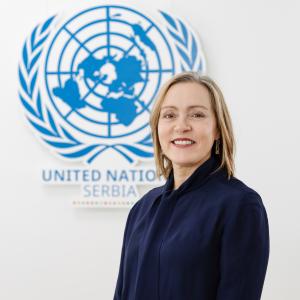Excellencies, colleagues, dear partners,
It’s a pleasure to join you this morning as we mark World Environment Day — and do so within the broader framework of the EU Green Week here in Serbia.
This year’s theme — Beat Plastic Pollution — is both timely and urgent. As the Secretary-General reminds us, plastic pollution is choking our planet. It is harming biodiversity, threatening human health, and accelerating the climate crisis.
This is no longer just about visible waste — plastics in rivers, oceans, or landfills. It’s about what we can’t see, too: microplastics now found in the air we breathe, the water we drink, and even in human blood and breastmilk. From the top of Mount Everest to the depths of the ocean — plastic pollution is everywhere.
This is a global crisis. And it demands a global response.
In just two months, countries will gather again to negotiate a new legally binding treaty to end plastic pollution. We need that agreement to be ambitious, inclusive, and enforceable — one that addresses the full life cycle of plastics and helps countries transition to circular economies.
It’s not just about recycling more. It’s about redesigning how we produce, consume, and live — in a way that respects the limits of the planet.
The United Nations is fully committed to this transition — globally, and here in Serbia.
As you’ve heard, UNDP is playing a leading role in supporting Serbia’s efforts to tackle plastic pollution: through legal reform, investment in innovation, and the promotion of circular economy solutions.
And this is also a broader UN effort involving agencies such as UNEP, UNECE, UNOPS, FAO, UNICEF and UNIDO. Across the system, we are working with national partners to strengthen environmental governance, promote sustainable resource use, and the circular economy, and engage young people and communities in shaping local solutions.
Together, we’ve helped improve frameworks for air quality, packaging waste, and energy efficiency. We’ve supported the development of Serbia’s first Green Infrastructure Strategy in Belgrade, and modernized heating systems in cities like Niš. We have helped restore ecosystems, supported the transformation of waste management, trained farmers in sustainable practices, and worked with students to monitor air quality and design solutions in their own neighborhoods.
All of this is made possible through strong partnerships. I want to thank the Ministry of Environmental Protection for its leadership, and express sincere appreciation to the European Union and UNDP for your ongoing cooperation and shared commitment.
Plastic pollution is a complex challenge — but one we can overcome. The tools are there. So is the momentum.
Let’s keep moving — together — with the urgency this moment demands.
Thank you.








